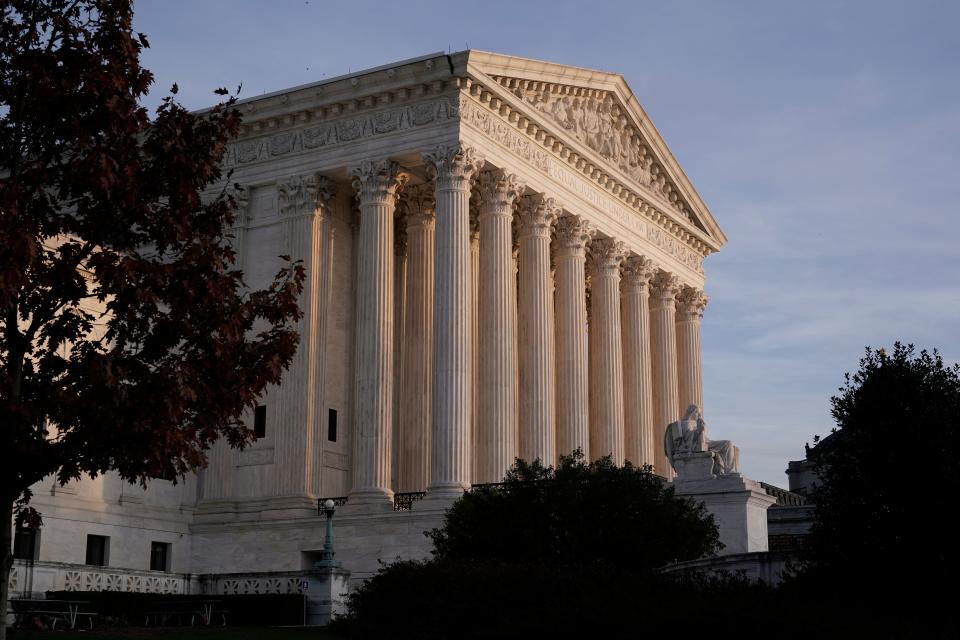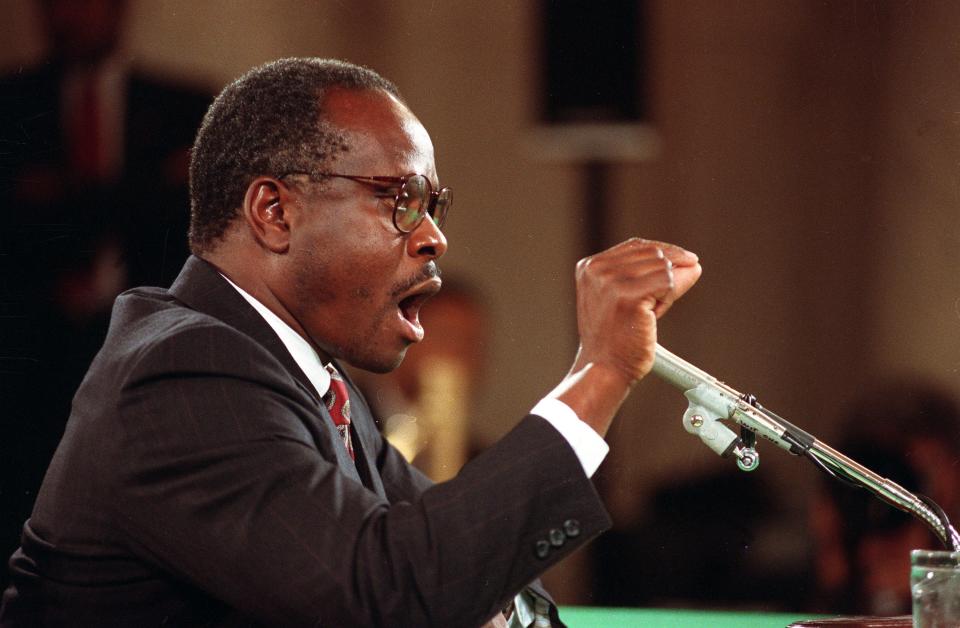Fact check: Claims on Clarence Thomas, Supreme Court and role in election are partly false
- Oops!Something went wrong.Please try again later.
The claim: After Joe Biden tried to 'destroy the life and reputation' of Clarence Thomas, he is 'in control' of SCOTUS, which will 'most likely' decide the election.
Long before Election Day, there was speculation that the result of the contest between President Donald Trump and former Vice President Joe Biden would be determined by the U.S. Supreme Court.
In fact, amid the confirmation fight over Justice Amy Coney Barrett in September, Trump told reporters, "I think this will end up in the Supreme Court, and I think it's very important that we have nine justices," per USA TODAY.
Ted Nugent — the singer-songwriter and guitarist who has become a vocal conservative activist — recently posted about the election and the high court on Facebook. His post, though, focused on a different justice: Clarence Thomas.
"In 1991, Senator Joe Biden did everything in his power to destroy the life and reputation of Clarence Thomas, who was eventually confirmed to the US Supreme Court," the post reads.
"Today, Thomas is firmly in control of the SCOTUS majority, the defacto Chief Justice. The 2020 election will most likely be decided in the Supreme Court," the post continues. "Joe Biden, meet your new master."
The post echoes a tweet from Benny Johnson, another conservative activist who works for Turning Point USA, on Oct. 26.
Nugent and Johnson have not responded to requests from USA TODAY for comment.
More: Fact check: Election unlikely to be decided in the House, even if Trump refuses to concede
It's unlikely the election will be decided by the Supreme Court
At this point, it's unlikely that the election will be decided by the Supreme Court.
Two and a half weeks after Election Day, all 538 electoral votes have been accounted for, leaving Biden at 306, Trump at 232, per USA TODAY. It only takes 270 votes to win, which means Biden has a cushion of 36 votes.
Trump has filed lawsuits in five states, with the following electoral votes: Pennsylvania (20), Georgia (16), Michigan (16), Arizona (11), and Nevada (6).
Biden is currently winning all five states by significant margins: Pennsylvania by 81,141; Georgia by 12,587; Michigan by 154,187; Arizona by 10,457; and Nevada by 33,596.
In any combination, Trump would need to have election results overturned in at least three of those states to surpass 270 votes.
Even if a lawsuit were successful, it's also not clear that it would impact enough votes to flip a state from Biden to Trump.
(In contrast, in 2000, George Bush held an unofficial lead of 1,784 votes in Florida.)
Richard Hasen, an election law expert and professor at the University of California-Irvine, told NPR earlier this month that Trump likely lacks a path to victory via the Supreme Court.
"Unless something new happens, I don't see a viable path for Trump to litigate his way out of an Electoral College loss," Hasen said.
A look at the lawsuits themselves also suggests they are unlikely to succeed.
Trump and his allies have filed 19 lawsuits since Election Day, per the New York Times.
They have had one victory, which resulted in a narrow category of ballots to be excluded from the count in Pennsylvania.
Another 13 of the 19 lawsuits have been denied, dismissed, or dropped.

What role does Clarence Thomas play on the Supreme Court?
Regardless of whether an election-related matter ends up in the Supreme Court, it's not accurate to say that Thomas alone "controls" the court's majority. Thomas is part of the 6-3 conservative majority. But he is not the chief justice. That title belongs to John Roberts.
It is true that of the eight associate justices, Thomas has seniority; he has been on the Supreme Court the longest — since 1991.
As for Roberts, he prefers to steers his court away from politics whenever possible, per USA TODAY.
During an appearance in New York City last year, Roberts said the court must decide cases "according to the Constitution and laws, without fear or favor."
"That’s necessary," he said, "to avoid the politicization of the court.”
More: Fact check: What's true and what's false about the 2020 election
What happened between Thomas and Biden in 1991?
In 1991, then-Senator Biden was the chairman of the Senate Judiciary Committee. In that role, he presided over the confirmation hearings for then-Judge Thomas.
The hearings were marked by the testimony of Anita Hill, a law professor who accused Thomas of sexual harassment.
Thomas has denied the allegations and was ultimately confirmed in the Senate, 52-48.
Biden has faced widespread criticism for his handling of the hearings — but most critiques focus on how he treated Hill, not how he treated Thomas.

Biden has been condemned for his failure to stop attacks on Hill, his decision not to call additional witnesses who could have corroborated her testimony, and for his own questions, which had an "accusing, skeptical tone," per New York Magazine.
Around the time he announced his presidential run, Biden called Hill and expressed regret for his actions — though she said he stopped short of an apology.
Later in 2019, he said on "Good Morning America" that he had "apologized for it," and would "apologize again."
“I believed her from the very beginning, but I was chairman. She did not get a fair hearing. She did not get treated well. That’s my responsibility,” Biden said. “As the committee chairman, I take responsibility that she did not get treated well."
Thomas also revisited the matter in 2019, in a documentary. He never mentioned Biden by name, but criticized the "modern day liberal," per ABC News.
"I felt as though in my life I had been looking at the wrong people as the people who would be problematic toward me. We were told that, 'Oh, it's gonna be the bigot in the pickup truck; it's gonna be the Klansmen; it's gonna be the rural sheriff,'" Thomas said. "But it turned out that through all of that, ultimately the biggest impediment was the modern day liberal. They were the ones who would discount all those things because they have one issue or because they have the power to caricature you."
Ultimately, though, how Biden treated Thomas and Hill is a matter of opinion, not fact.
Our rating: Partly False
Based on our research, the claim that after Joe Biden tried to "destroy the life and reputation" of Clarence Thomas, Thomas is "in control" of the Supreme Court majority, which will "most likely" decide the election, is PARTLY FALSE.
Let's break that down. First, it's unlikely at this point that the election will be decided by the Supreme Court — at least three lawsuits in three separate states, impacting 10,000 or more ballots in each state, would have to succeed to change the outcome. Second, it's not accurate to say that Thomas is "in control" of the Supreme Court's majority — though he is part of the 6-3 conservative majority and is the most senior associate justice, he isn't the chief justice. Lastly, how Biden treated Thomas in his confirmation hearings is a matter of opinion — and is therefore neither true nor false.
Our fact-check sources:
USA TODAY, Accessed Nov. 20, 2020 Presidential Election Results & Electoral Map
Pennsylvania Department of State, Accessed Nov. 20, Unofficial Statewide Results
Georgia Secretary of State, Accessed Nov. 20, General Election Results
Michigan Secretary of State, Accessed Nov. 20, 2020 Michigan Election Results
Arizona Secretary of State, Accessed Nov. 20, General Election Unofficial Results
Silver State 2020, Accessed Nov. 20, Unofficial Election Results
NPR, Nov. 7, Will This Election Be A Replay Of Bush v. Gore At The Supreme Court? Not Likely
New York Times, Nov. 19, Trump Is Not Doing Well With His Election Lawsuits. Here’s a Rundown.
USA TODAY, Nov. 5, Will the Supreme Court ride to Donald Trump's rescue? Don't count on it.
New York Magazine, May 7, 2019, A Brief Guide to the Joe Biden–Anita Hill Controversy
ABC News, April 29, 2019, Joe Biden on handling of Anita Hill during Clarence Thomas hearings: 'I take responsibility'
ABC News, Nov. 28, 2019, Justice Clarence Thomas rebukes Biden-led confirmation hearings in new film
Thank you for supporting our journalism. You can subscribe to our print edition, ad-free app or electronic newspaper replica here.
Our fact check work is supported in part by a grant from Facebook.
This fact check is available at IFCN’s 2020 US Elections FactChat #Chatbot on WhatsApp. Click here, for more.
This article originally appeared on USA TODAY: Fact check: It's unlikely Supreme Court will decide the election

